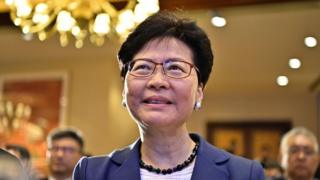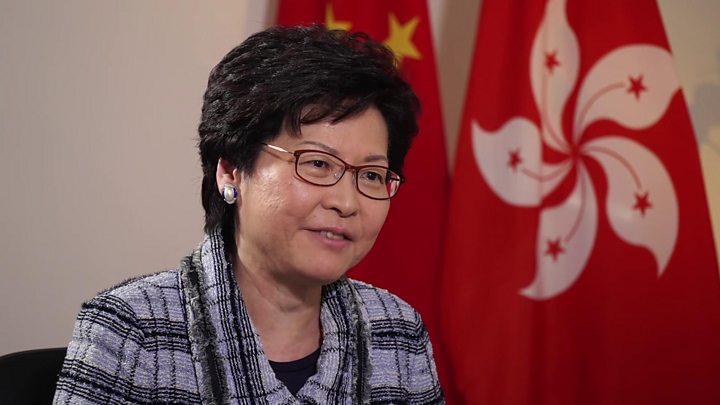Profile: Carrie Lam, Chief Executive of Hong Kong
Hong Kong’s Chief Executive Carrie Lam has been forced to announce a U-turn, suspending plans to allow extraditions to mainland China after huge protests in the city.
It was her first serious challenge since being elected elected in 2017 as the city’s first female leader. At the time, she was not the popular candidate for the top spot.
However she was favoured by Beijing – and by those who decide who leads the territory. The chief executive is chosen by a committee of 1,200 people who are said to represent the city.
She won with a total of 777 votes, a number that has since become one of her nicknames in Hong Kong.
Ms Lam previously told the BBC: “I don’t think it’s a question of a number. The question is about legitimacy. The election committee itself is formed from a much larger electorate representing broadly all the sectors in society in Hong Kong.”
A long-serving civil servant
Ms Lam, a Roman Catholic, was born in Hong Kong and comes from a working class background.
The New York Times describes her as a “workaholic”, regularly sleeping just three or four hours a night.
She joined the civil service in 1980 after graduating from the University of Hong Kong.
During her time there, she was sent to the University of Cambridge for a one-year diploma course in Development Studies.
In 2004, she was appointed Director General of London Hong Kong Economics Trade Office. It is the city’s representation in the United Kingdom.
She returned to Hong Kong in 2006, climbing through the ranks.
Ms Lam gave up her British nationality in 2007 in order to serve as secretary for development.
Her husband and two children retained their British passports. Ms Lam’s husband resides in the UK along with one of their sons. The other lives in mainland China.
The Umbrella Movement
Ms Lam was Chief Secretary for Administration during the 2014 pro-democracy protests in Hong Kong, serving under then Chief Executive Leung Chun-ying.
Protesters occupied key areas in Admiralty and Causeway Bay for 79 days.
After the protests ended, she held talks with five student leaders. The talks focused on the students’ demands that China reconsider its ruling on how candidates for elections are chosen.
She rejected the demands saying: “As far as their position is concerned I’m afraid we can only agree to disagree.”
The first female Chief Executive
Ms Lam was sworn into office by Chinese President Xi Jinping on 1 July 2017, the 20th anniversary of Hong Kong’s return to Beijing.
In her acceptance speech she said: “Hong Kong, our home is suffering from quite a serious divisiveness and has accumulated a lot of frustrations. My priority will be to heal the divide.”
She reportedly never backs down in a political battle, threatening to resign if she does not get her way. This tough stance has earned her the nickname the “good fighter” .
However her time in office has been marred by the extradition bill.
Ms Lam argues that the bill is necessary to protect the city against criminals. It comes after a high-profile case where a Hong Kong man was accused of murdering his girlfriend on holiday in Taiwan but could not be extradited.
However many feel the law could be used to target political opponents of the Chinese state.
Up to one million people marched on the streets of Hong Kong last Sunday.
Ms Lam’s announcement that she would delay the bill was viewed as an important concession towards the protesters but it remains to be seen what the extradition bill will mean for her political career in the long run.
“Her credibility is now severely dented,” Anson Chan, once Hong Kong’s second highest official, told the New York Times.
“If she insists on bulldozing this proposal through the Legislative Council, where pro-Beijing parties have a majority, she will find it increasingly difficult to govern Hong Kong in the next three years.”
Source: Read Full Article




